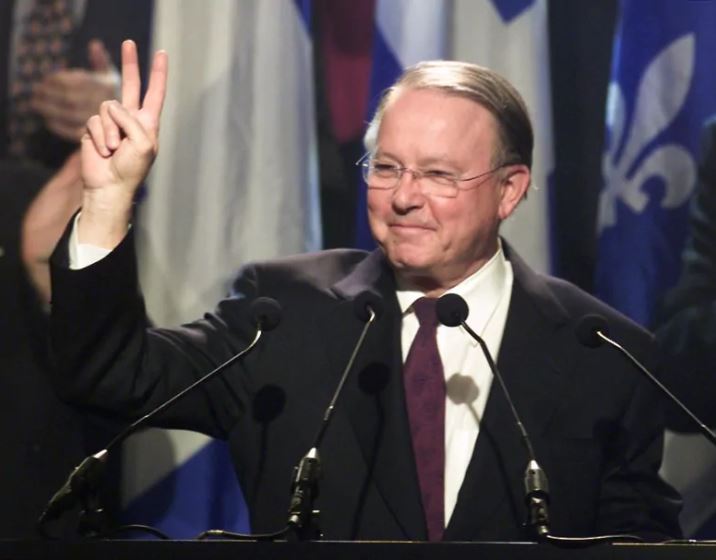
Bernard Landry was buried from Notre Dame Basilica in a state funeral today in Montreal.
He was the Parti Quebecois premier of the French-speaking province of Quebec from March 2001, when the charismatic Lucien Bouchard resigned, until the party lost to the provincial Liberals at the polls in the 2003.
Landry, 81, had been a lawyer by profession, and was a staunch supporter of sovereignty-association for Quebec, a separatist arrangement similar to the European Union model.
He was remembered fondly by many today, and his legacy in terms of the current economic recovery of Quebec should not be underestimated.

Bernard Landry, pictured here in 2001 when he was acclaimed leader of the Parti Québécois. A week later, Landry was sworn in as 28th premier of Quebec. (Paul Chiasson/Canadian Press)
Landry played a key role in encouraging the now burgeoning tech sector, and he also completed the paradigm-setting agreement with the Indigenous Cree nation of Quebec.
Known as, La Paix des Braves, French for “The Peace of the Braves” it is a 50-year agreement that established the first nation to nation relationship with a First Nation, outlining the provincial government’s responsibilities and the revenue sharing arrangements for the natural resources, particularly the hydroelectric development of the James Bay region.
On November 27th, Francois Legault a former colleague of Landry’s will be leading the government when the province’s National Assembly reconvenes.
But for the first time in 50 years, the leader is not from the federalist Liberal party, or separatist Party Quebecois.
Francois Legault left politics in 2009 and returned in early 2011 to start a new party known as the Coalition Avenir Quebec, (CAQ), or the Coalition for the Future of Quebec.
It was established with a promise that the move toward separation from Canada would stay on the back burner.
It became evident in this last election that separatism is done for now, as the separatist party had their lowest showing ever, and the leader, Jean-Francois Lisee was defeated in his own riding.
Legault, a 61-year-old millionaire, and co-founder of Air Transat, is Quebec’s 32nd premier.
Moshe Lander is a lecturer in Concordia University’s Department of Economics, and he has concerns about some of Legault’s campaign promises.
“The extra taxes that he wants to implement, these things are bad economically, they’ll go down well with his voters, and that is what the voters asked him to do, but I think that Quebec’s strength is in more liberalization of the market place, in more flexibility not less. And I think some of the spending plans and tax plans that he’s introducing are going to maybe compromise some of the gains that the Liberals brought in over the last decade.”


